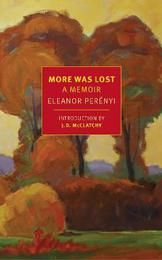
|
More Was Lost: A Memoir
Paperback / softback
Main Details
| Title |
More Was Lost: A Memoir
|
| Authors and Contributors |
By (author) Eleanor Perenyi
|
| Physical Properties |
| Format:Paperback / softback | | Pages:288 | | Dimensions(mm): Height 203,Width 130 |
|
| Category/Genre | Memoirs |
|---|
| ISBN/Barcode |
9781590179499
|
| Classifications | Dewey:818.5409 |
|---|
| Audience | |
|---|
| Edition |
Main
|
|
Publishing Details |
| Publisher |
The New York Review of Books, Inc
|
| Imprint |
NYRB Classics
|
| Publication Date |
16 February 2016 |
| Publication Country |
United States
|
Description
Best known for her classic gardening book Green Thoughts: A Writer in the Garden, Eleanor Perenyi had quite a wordly life before settling down in Connecticut with her flowers. More Was Lost is a memoir of her youth abroad, written in the early days of World War II after her return to the United States. In 1937, at the age of nineteen, in the midst of a European tour with her mother, Perenyi falls in love with a poor Hungarian baron and in short order acquires both a title and a struggling country estate at the edge of the Carpathians. She throws herself into this new agrarian life with zeal, learning Hungarian, and observing the invisible order of the Czech rule, the resentment of the native Ruthenians, and the haughtiness of the dispossessed Hungarians. In the midst of massive political upheaval and shifting allegiances, Perenyi and her husband remain steadfast in their dedication to their new life together, an alliance that would soon be tested by the war. With old-fashioned ease, frankness, and wit, Perenyi recounts this tragic tale of how much was gained and how much more was lost.
Author Biography
Eleanor Perenyi (1918-2009) was born in Washington, where she attended the National Cathedral School for Girls before leaving with her parents--Ellis Spencer Stone, a naval officer who worked as a military attache to the American Embassy in Paris, and Grace Zaring Stone, a novelist--to travel. In 1937 she met Baron Zsigmond Perenyi at a diplomatic dinner in Budapest and married him shortly after, moving to his family's castle in Ruthenia, under Czech rule at the time. The author tended to the family's 750-acre farm and would continue garden for the rest of her life, writing Green Thoughts in 1981, widely considered a garden writing classic. World War II put Ruthenia in political turmoil, and in the 1940s the author left Europe, divorced Baron Perenyi in 1945, and eventually settled in New York and then Connecticut, working at various magazines, including Harper's Bazaar and Mademoiselle.
Reviews"The book is entirely unpretentious...It is always lucid and crisp...If it is possible to draw a moral from the story, it would have to have something to do with the enormous and dangerous discrepancy between the traditional American way of taking Europe as a delightful fairy tale and the picture it actually presents: of absurd, anachronistic nationalisms and unequal stages of social development tearing one another to pieces." -Edmund Wilson, The New Yorker "[Parts] of More Was Lost...read more delightfully than fiction. The book is full of delightful anecdotes, glimpses of semi-feudal life, vignettes of the friends and relatives with whom the Perenyis passed their days." -Catherine Maher, The New York Times "The baronial way of life that Eleanor recorded has the historical detail of Patrick Leigh Fermor's Between the Woods and the Water, yet there is none of the traveler's distance in her writing." -Richard Teleky, The Hopkins Review "[Perenyi] emerges from her own pages a thoroughly likable person...her book is soaked in the atmosphere of a society and way of life that were several centuries outdated even before the Germans and the Hungarians and the Ruthenians and the Russians finally obliterated it from the world. The feudalism of Hungary was rusty and obsolete, but it had its charms. Now they are only memories, so that More Was Lost has the appeal of a lost cause." --Orville Prescott, The New York Times It's tempting to call this lovely little book "charming," but it's much steelier-and sadder-than that...How lovely that More Was Lost is lost no more. -Britta Bohler, Open Letters Monthly
|